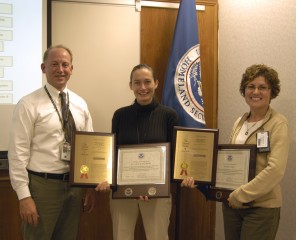The Science and Technology Directorate (S&T) at the Department of Homeland Security (DHS) has developed a portable dosimeter for measuring a person’s exposure to ionizing radiation. The miniaturized dosimeter, called Citizen's Dosimeter, is small enough to fit in a wallet and provides early detection during bomb or nuclear accidents.
The Citizen's Dosimeter is a high-tech plastic card that provides real-time radiation detection. The small-sized card would benefit the general public and emergency responders.
 Adam Hutter, Director of NUSTL, presents Cecilia Murtagh (center) and Gladys Klemic with plaques commemorating DHS's first patent.
Adam Hutter, Director of NUSTL, presents Cecilia Murtagh (center) and Gladys Klemic with plaques commemorating DHS's first patent.
People working in nuclear plants wear personal radiation dosimeter badges. The data about the radiation dose collected by the badge has to be sent to a lab for processing as it cannot be read at the location. The Citizen's Dosimeter would provide data on the spot. The National Urban Security Technologies Laboratory (NUSTL) has received a patent covering radiation dosimetry technologies. NUSTL is managed by the DHS S&T and this is DHS's first patent.
NUSTL physicist, Gladys Klemic and her team created the dosimeter with an aim to reduce both the cost and the size. They wanted to create an effective thin card. They tested different materials and found that the chemical element tantalum enabled them to create a card that had minimal thickness and provided accurate readings. They combined tantalum in a stainless steel filter with a double-layer, which reduced the number of false positives. Landauer from Illinois provided the radiation-sensitive material for the study. The card was designed to meet the American National Standards Institute requirements.
NUSTL has formed a team to develop a new portable card reader to disclose the radiation dose calculated by the Citizen's Dosimeter. The team comprises StorCard, Nomadics and experts in the field of radiation detection at the Oklahoma State University and Landauer.